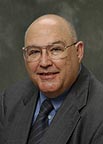November 05, 2007
Engineering dean plans to retire in January

Caption follows story
Osborne, who came to SIUC as the engineering dean in 2005, will retire as of Jan. 4. He said he will remain active in conducting research at SIUC, especially working with a colleague here on explosives detection technology for the U.S. Navy.
Don Rice, interim provost at SIUC, said the college soon will select an interim dean from its professors. The college will form a search committee to find a new dean late next spring and conduct the search beginning in the summer, with the goal of hiring someone who can start work in July 2009. Rice said the college faculty is delaying the search process to avoid conflicts with an upcoming accreditation review set for fall 2008.
A Paducah native, Osborne came to SIUC from the University of Missouri-Kansas City, where he served as provost and vice chancellor for academic affairs. Before that, he was dean of that university's School of Computing and Engineering and dean of the Erik Jonsson School of Engineering and Computer Science at the University of Texas-Dallas from 1995 to 2002. He was a professor of electrical and computer engineering at New Mexico State University from 1990-1995.
Before entering academia, Osborne worked as an electrical engineer for several companies. He earned a bachelor's degree and a master's degree in electrical engineering at the University of Kentucky and his doctorate at New Mexico State University.
Most of Osborne's professional career revolved around telecommunications, working on satellite and wireless communications among others.
Osborne said his two and a half years at SIUC have been spent expanding programs and working on enrollment and retention issues.
Specifically, Osborne oversaw the creation of a new biomedical engineering graduate program, which started this fall. Osborne said the program has great potential to bring in more students as that employment sector continues growing.
"That sector has been the fastest-growing in the engineering field in the U.S. for several years," Osborne said. "And it attracts a lot of female engineers, about 50 percent."
The college also received a $1.2 million grant from the National Science Foundation aimed at increasing retention and graduation rates and registered an increase in enrollment this year, as its recruiting and retention strategies begin to pay off, Osborne said. As part of that strategy, three residence halls are now the exclusive homes of freshman and sophomore engineering students, who must live in the halls.
The residence halls include rooms to teach engineering courses and group study areas. Peer and faculty support for residents also is included in the approach.
"We've tried to create a living-learning community in those residence halls and we think it is working," Osborne said. "Most students who leave college don't flunk out or quit for lack of money, they choose to leave. So we're trying to use old-fashioned peer pressure to keep them in school. They don't want to let their friends down."
The grant also paid for expanding the college's summer bridge program, providing engineering-designated sections of several courses and other services. Osborne also redesigned the college's advisement office and brought in new techniques, such as sending freshman students back to their prospective high schools during breaks to recruit, to the college.
"We wanted them to be there in front of the students telling our story," he said.
Osborne said he plans to continuing working on a project for the U.S. Navy that involves technology that can sense whether electronics are present in a device, possibly indicating whether it is an explosive. He is working with Spyros Tragoudas, professor of electrical and computer engineering, on the project.
Osborne said after he retires he hopes the college will continue increasing its federally funded research, especially from groups like the NSF, National Institutes of Health and Department of Defense.
In the meantime, Osborne plans to travel the Great American Loop, a waterway trip though the rivers of the Midwest and up the east coast shoreline of the continental United States with his wife, Mary Anne, onboard their trawler.
John Nicklow, associate dean of the College of Engineering, worked closely with Osborne on the recruitment and retention issues. He said Osborne has provided a spark during his tenure as dean.
"Dr. Osborne's arrival a few years ago was the shot in the arm that the college needed to make progress," Nicklow said. "His work as dean has been good for the college, good for SIUC and good for the community.
"He will be missed," Nicklow said. "He certainly has demonstrated strong leadership and sound decision-making skills. He has done an exceptional job of setting and balancing priorities.
